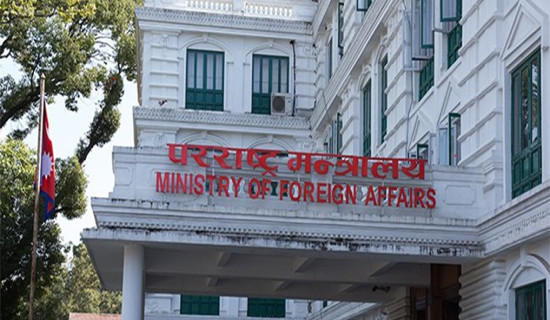- Wednesday, 4 March 2026
TU Reform Nowhere In Sight
Not very long back, Tribhuvan University (TU) picked up a row over the appointment of the head of the sociology department under humanities and social science stream. It was alleged that the appointment had been pushed overriding the precedence of seniority reportedly under the influence of partisan politics. The TU academic position appointment guidelines, endorsed a few months ago, stipulates that the TU academic positions, including deans, campus chiefs, should be recruited based on competitive selection process. But this has not been followed and upheld by the TU authorities, revealing the party-inspired tussle over several appointments in different positions. Though there have been demands raised from academic quarters to bar the prime minister from occupying the post of chancellor, this has not been implemented.
Former prime minister Pushpa Kamal Dahal Prachanda had committed to reform the provision to ensure that executive head of the government would no longer remain chancellor of the university. But he did not implement it. According to the provision of law, prime minister, by virtue of his official capacity as the executive head of the government, becomes the chancellor of the public or government-aided universities. It is a continuation of the previous practices and traditions that was set when the university was established almost sixty years ago. Today as the country has become federal democratic republic, which calls for an independent robust academic institutions to respond to the imperatives of the new political milieu, time has come to review the provision that vests in the prime minister through institutional reform.
Disruptive activities
Despite tall political pledges and promises to insulate TU from political interference, student unions and unionised teachers tend to carry out obstructive and disruptive activities to vitiate the academic environment. Prime minister, ministers and government authorities are all consistently asking the students to stop the practices of carrying out disruptive activities to taint the sanctity of the academic institutions. However, no institutional reform has been initiated to contain the party-guided student unions from carrying out the actions that disrupt the academic activities.
The new TU vice chancellor Dr. Keshar Jung Baral has admitted the fact that the party politics has deeply engrained in the body politic of TU. It has posed difficulties for him to carry out necessary improvements in the structure and functions of the university. Even though he reached out to persuade the political leaders to refrain from using academic stakeholders to serve political ends especially in the academic institutions, his exhortations have seemingly fallen on deaf years. The new TU vice chancellor has recently made a prognosis of several thorny issues plaguing the apex institution of learning in the country and flagged some reform initiatives and proposed some initiatives too.
But despite his good intention and sincerity of purpose, he has not been able to confront and tackle the TU's tangled situation. The internal academic control, discipline and integrity has been severely compromised. Even the minimum rigour and sanctity of exams have not been maintained. It needs to be mentioned that the TU Service Commission's image has taken a beating due to widely reported compromise on the exam ethics and integrity during the previous years. Similarly, the TU's scheduled exams have also met with controversy for failing to keep reasonable standard of care. Though the incumbent VC Dr. Baral may not be a politically identified person as he was selected on competitive basis, his access to levers of political power and cozying up with the previous CPN- Maoist Centre-led government executives had been reportedly instrumental for his appointment.
An open call was made for the position claiming that the vice-chancellor would be appointed fairly. However, Baral, close to the Maoist Centre, landed the position. As many as 43 candidates, most of them university teachers, had applied for the position. Of them, 14 were shortlisted and interviewed. They also presented their visions of how they would lead the country’s oldest and largest university. A three-member search committee headed by the then Minister for Education Ashok Kumar Rai had recommended Chitra Bahadur Budhathoki, Baral and Tankanath Dhamala for the position. In 2007, Baral was appointed the vice-chancellor of Pokhara University for four years.
Partisan politics
However, university teachers seem not very committed to improve the academic environment indicated by their indulgence in extra-academic actions. A scrutiny of the incidents of strikes and stoppage of academic actions executed by teachers shows that the demands put forth by teachers had any relations with reforming academic environment and management of the university. Admit it or not, whichever party holds the reins of the government, the partisan politics has defined and dictated the destiny of the TU for long. There is a pressing need to let the academic institutions like TU exercise more autonomy and make it accountable to its performance.
As public universities and campuses are indiscriminately politicised, public intellectuals and educationists articulate the need to separate academics and politics and protect the sanctity and integrity of the academic institutions. The trade unionism that has made inroads into the realm of both teachers and students should be properly regulated and managed. Unless this is done in an earnest manner, our public institution of learning will rot in no time. The state authorities should be serious enough to salvage the university from the intractable crisis.
(The author is presently associated with Policy Research Institute (PRI) as a senior research fellow. rijalmukti@gmail.com)
















